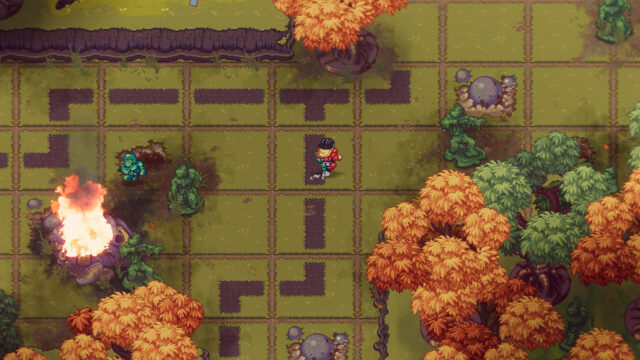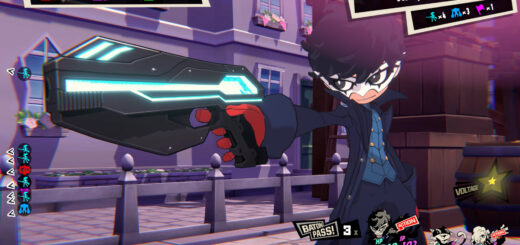WrestleQuest Deep Look
Unfortunately, while it brings some neat ideas to the ring, the execution places far too many roadblocks in the way.
WrestleQuest has a lot on the surface that will appeal to many RPGamers out there. Combining the pageantry of professional wrestling with a larger-than-life toy box themed world, retro sprite graphics, puzzle-elements, and a turn-based combat system, the game brings about a fascinating melding of interesting ideas. However, each of those elements also brings its own issues to the table and the resulting experience is unfortunately one that is simply a slog to work through.
WrestleQuest splits its narrative between two main characters. Randy “Muchacho Man” Santos is a wannabe professional wrestler hoping to earn his big break. Meanwhile, Brink Logan is a loyal stablemate always doing what’s best for his family’s small promotion. The two offer an interesting dichotomy in their attitudes, helping to address the nature of kayfabe; Randy is of the firm belief that that wrestling is the greatest sport around and that everything is real despite evidence to the contrary, while Brink is much more grounded in understanding the business of entertainment but still appreciative of the necessary effort and skill required to put on a show. The early game alternates between the two characters and their allies’ stories, interspersed with somewhat bizarre vignettes in a wrestling podcast studio.
The development’s team wrestling fandom and knowledge is plain to see from the outset, with references to and appearances from famous wrestlers throughout the years. WrestleQuest’s toy box world, where wrestling is all-important, allows it to have fun with the source without really needing it all to make sense or line up logically. The other side of this is that players are left doing things purely because that’s what they’ve been directed to do and relying mostly on humour to provide its entertainment factor. Unfortunately, while it has some moments and fun references, it all feels very one-note, often eliciting little more than a brief chuckle while the rest of the time is waiting in the hope of something substantial.
One of the more interesting elements, at least at first, is seeing how the game blends wrestling and traditional turn-based RPG combat, with every fight from scripted story bouts to regular encounters while exploring taking place in the ring. Its format sees the party of three facing off against a similar number of opponents. The player’s team takes their turns first, followed by the opponent. Each combatant can choose one action from a regular attack, a special move (known as gimmicks and which include unlockable tag-team combo moves), use an item, or taunt the enemy. However, a wrestling match is not only a matter of beating up an opponent until they fall over, many enemies — and the player’s team — will not be defeated until they are successfully pinned by connecting three timed button presses.
Furthering the connections to wrestling is the game’s hype meter. Ostensibly to emulate the necessity of a match exciting the crowd, the hype meter generally grows as players do useful acts and drops as enemies do them, conveying rewards or hindrances depending on its state. Depending on the party setup, certain actions can be greater rewarded with the hype meter, but trying to manipulate it in any meaningful way during the combat is largely not worth the effort as individual action often have minimal effects. There may be options later on that bring the system to the fore, but the number of standing combatants acting has a greater sustained impact than anything else. Certain story battles will also task players with doing specific things in combat, usually to their own detriment, but again the game makes the process of doing this so unfriendly, without encouraging enemies to do anything to play their part in the process.
There’s a further sense of imbalance in the timed-button presses that accompany regular attacks and a number of gimmicks, somewhat emulating when wrestlers bounce back from the ropes. They take a little time to get to grips with, and players will need to keep up their attention and be ready for them, as while successful hits grant minor rewards, there is usually a heftier punishment for missing. The downside to this is it means that there’s no option to skip or shorten any combat animations, which leads to a tiresome experience in the first place, made worse by the fact that players will face the same two or three enemies again and again within each area, being forced to sit through the same skill and attack animations over and over. Though there is some merit to its ideas, there simply isn’t enough substance to combat to make it engaging for an extended length of time.
Also not helping is the feeling that exploration is glacially-paced. The default walking speed is very slow compared to the size of the areas, and even the sprinting speed isn’t that much better. The game lacks any form of mapping outside of a radar displaying the direction of the current quest target point, and with the slow speed, repetitive battles, and generally uninteresting locations, getting where players need to go is tedious. Again, WrestleQuest tries some interesting ideas with a few puzzles and sections where the party needs to split up to get through obstacles, unlocking paths for each other, but these quickly start to grate, particularly when they frequently force further battles on those split parties for any perceived misstep such as stepping under a spotlight. It already feels like it takes longer than necessary to get from place to place, and the narrative and gameplay rewards for doing so are lacking.

WrestleQuest looks to include traditional RPG exploration and puzzles, but fail to inspire much enjoyment.
The game includes a small amount of voice acting, largely limited to a selection of clips that are played during conversations, and don’t necessarily match the text in any way, more conveying what that character sounds like in general rather than the relevant statement. It’s not detracting in any way once players realise that’s what it’s doing, but equally doesn’t add much either. The sprite work is by and large good, working well with the toy box world theme, and it’s neat to see the wrestling inspirations and legends committed to its graphical style. Animations are generally fine, but it quickly becomes tiresome to sit through the same ones again and again.
Its interesting mix of turn-based combat and wrestling drummed up a good amount of interest in WrestleQuest. There’s also an earnest love for professional wrestling and its history that comes through. Unfortunately, while it brings some neat ideas to the ring, the execution places far too many roadblocks in the way. Repetitive combat, slow exploration and progress, and a pretty one-note cast fails to inspire the sort of hype that the game hoped to provide.
Disclosure: This article is based on a copy of the game provided by the publisher.








Recent Comments